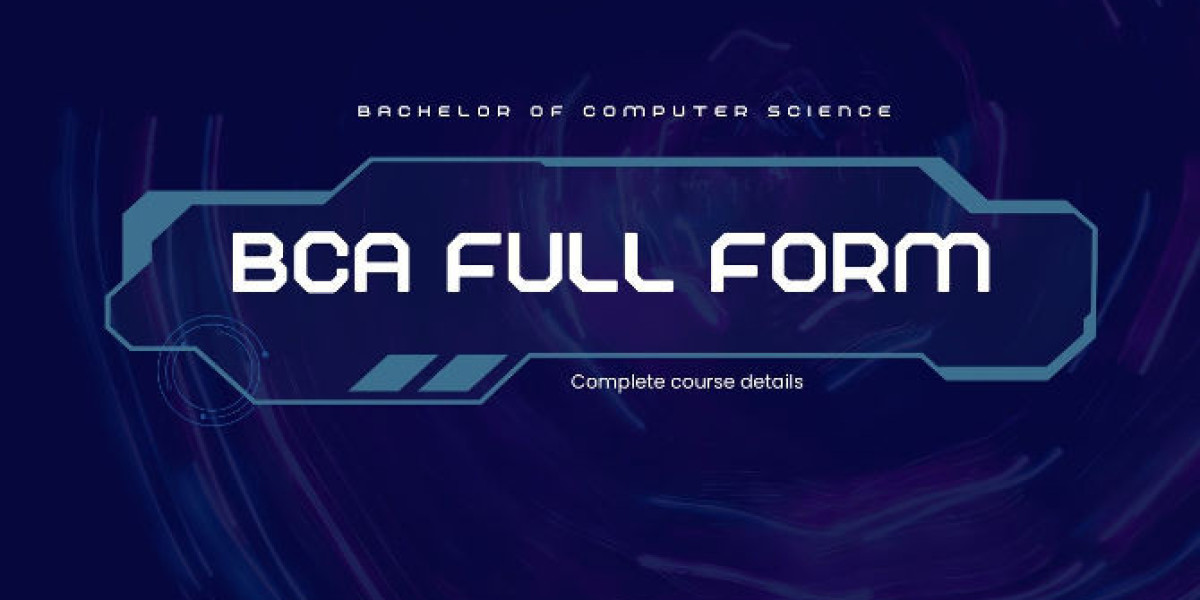In today’s tech-driven world, the role of information technology (IT) professionals has become indispensable. The ever-expanding digital landscape has given rise to numerous career opportunities in fields such as software development, cybersecurity, and database management. One of the most popular paths for students looking to enter the IT industry is through the BCA (Bachelor of Computer Applications) degree. The BCA Full Form stands for Bachelor of Computer Applications, a comprehensive undergraduate degree that offers students the foundational knowledge required to build successful careers in the world of technology.
In this article, we will explore the BCA Full Form in detail, understand the structure of the BCA program, discuss the skills it imparts, and examine the numerous career opportunities available to BCA graduates. Whether you’re someone considering a career in IT or curious about the BCA Full Form and its implications, this guide will provide you with all the information you need.
What is the BCA Full Form?
The BCA Full Form is Bachelor of Computer Applications, a three-year undergraduate program designed to equip students with the technical expertise and practical skills required to work in various IT roles. The program is tailored for those interested in gaining a deeper understanding of computer science, programming, software development, and IT systems.
BCA focuses on providing students with a mix of theoretical knowledge and hands-on experience in technology. The curriculum covers topics like programming languages, web development, software engineering, networking, and database management, making it a versatile degree for anyone looking to make a mark in the IT sector.
The BCA program is offered by numerous universities and colleges around the world, with a curriculum that often aligns with industry trends and emerging technologies. The degree is generally open to students who have completed their higher secondary education (12th grade) with a background in science or commerce, especially with mathematics as one of their core subjects.
Why Pursue a BCA Degree?
The IT industry is among the most dynamic and rapidly evolving sectors. With digital transformation affecting nearly every industry—from finance and healthcare to entertainment and e-commerce—the need for skilled IT professionals is immense. Here are some of the key reasons why pursuing a BCA degree can be an excellent choice for aspiring IT professionals:
1. Comprehensive Knowledge of Computer Applications
The BCA program offers a thorough understanding of the various components of computer science and technology. Students learn core subjects like programming languages, data structures, software development, database management, operating systems, and networking. The curriculum is designed to give students a solid foundation in the principles and practices of IT, preparing them for a wide range of roles in the technology sector.
2. Hands-on Practical Learning
Unlike many traditional academic programs, the BCA degree places a significant emphasis on practical learning. Students are encouraged to work on projects, internships, and hands-on exercises, allowing them to apply theoretical concepts to real-world scenarios. This practical approach not only helps students understand how technology works but also equips them with the technical skills that are highly sought after in the IT industry.
3. Exposure to Emerging Technologies
As technology advances at a rapid pace, it’s important for students to stay ahead of the curve. The BCA program introduces students to emerging technologies such as artificial intelligence (AI), machine learning (ML), cloud computing, big data analytics, and blockchain. These topics are crucial for anyone interested in working with cutting-edge technologies and innovations.
Students pursuing a BCA degree are given the tools and knowledge to stay competitive in a job market that constantly demands professionals familiar with the latest technological advancements.
4. Diverse Career Opportunities
One of the most appealing aspects of the BCA degree is the wide variety of career paths it opens up for graduates. Whether you are interested in software development, web design, or IT consulting, the BCA program provides the necessary skills to pursue these and other in-demand roles. In addition, the degree provides a solid foundation for further studies, such as pursuing a Master of Computer Applications (MCA) degree or certifications in specialized fields.
Structure and Curriculum of the BCA Program
The BCA program is typically divided into six semesters, with each semester offering a mix of theory and practical coursework. While the exact curriculum may vary from one institution to another, here is a general overview of the subjects and topics covered in a typical BCA program:
1. Semester 1: Introduction to Computer Applications
In the first semester, students are introduced to the basics of computer science, IT systems, and programming languages. Some of the key subjects typically covered in this semester include:
- Introduction to Computers
- Mathematics for Computer Science
- Fundamentals of Programming in C
- Digital Logic and Design
- Computer Organization
2. Semester 2: Advanced Programming Concepts
Building on the basics learned in the first semester, the second semester dives deeper into programming and software development. Students learn advanced programming languages and concepts, including:
- Object-Oriented Programming in C++
- Data Structures and Algorithms
- Discrete Mathematics
- Computer Networks
- Database Management Systems (DBMS)
3. Semester 3: Web Development and Software Engineering
As the program progresses, students gain exposure to web development and the processes involved in software engineering. The following subjects are usually covered:
- Web Programming (HTML, CSS, JavaScript)
- Software Engineering Principles
- Java Programming
- Operating Systems
- Relational Database Management Systems (RDBMS)
4. Semester 4: Advanced Software Development Techniques
In the fourth semester, students learn more about advanced software development techniques, along with specialized topics in programming and computer systems. Topics covered include:
- JavaScript and PHP for Web Development
- Software Testing and Debugging
- Network Security
- Mobile App Development
- Advanced DBMS Techniques
5. Semester 5: Specialized Topics in IT
In the fifth semester, students begin to specialize in areas that interest them, such as mobile computing, cybersecurity, or big data. Some of the key topics include:
- Cloud Computing
- Data Analytics
- Mobile Computing and App Development
- Cybersecurity
- Computer Graphics
6. Semester 6: Project Work and Industry Exposure
The final semester is dedicated to project work, internships, and industry exposure. Students work on a real-world project that integrates the concepts and skills learned throughout the program. This semester also prepares students for entering the workforce by focusing on:
- Project Development
- Internships
- IT Consulting
- Technical Presentations
- Industry-based Training
Skills Acquired Through the BCA Program
The BCA program is designed to provide students with both technical and soft skills, making them well-rounded professionals. Some of the key skills gained through the program include:
Programming Skills: Students become proficient in multiple programming languages such as C, C++, Java, Python, and PHP, enabling them to develop software applications, websites, and systems.
Problem-Solving Skills: BCA students are trained to approach problems systematically and develop effective solutions, a skill that is highly valued in any IT role.
Database Management: With a solid understanding of databases, students are equipped to design, manage, and secure data in an efficient manner.
Web Development: Students gain expertise in building and maintaining websites, using technologies such as HTML, CSS, JavaScript, and PHP.
Cybersecurity and Networking: The BCA program includes modules on network administration and cybersecurity, preparing graduates to manage and secure IT infrastructures.
Teamwork and Communication: BCA students often work on group projects, enhancing their ability to collaborate and communicate effectively in a professional environment.
Career Opportunities After BCA
Upon completing a BCA degree, graduates can pursue a variety of roles in the IT industry. Here are some of the career paths available to BCA graduates:
1. Software Developer
As a software developer, BCA graduates design, develop, and maintain software applications, creating solutions that meet the needs of businesses and consumers. Proficiency in programming languages is essential for success in this role.
2. Web Developer
Web developers design and build websites, ensuring they are functional, responsive, and user-friendly. BCA graduates with expertise in HTML, CSS, JavaScript, and other web technologies are highly sought after.
3. Database Administrator (DBA)
DBAs are responsible for the design, implementation, and maintenance of databases. BCA graduates with strong knowledge of database management systems can work as DBAs, ensuring that data is secure and easily accessible.
4. Network Administrator
Network administrators manage and maintain an organization’s computer networks, ensuring that the systems are secure, efficient, and reliable. BCA graduates with knowledge of networking protocols and security measures can excel in this role.
5. Cybersecurity Analyst
As cybersecurity threats become more sophisticated, there is an increasing demand for professionals to protect organizations from data breaches, hacking attempts, and other security risks. BCA graduates can work as cybersecurity analysts, safeguarding sensitive information.
6. IT Consultant
IT consultants provide expert advice to businesses on how to use technology to improve their operations and achieve their objectives. They assess a company’s IT infrastructure and recommend solutions to optimize performance and security.
Conclusion
The BCA Full Form (Bachelor of Computer Applications) represents an essential undergraduate degree for anyone interested in pursuing a career in information technology. By providing a solid foundation in computer science, programming, and IT applications, the BCA program equips students with the skills and knowledge needed to succeed in the rapidly evolving tech industry.
Whether you’re interested in software development, web development, networking, or cybersecurity, the BCA program opens the door to a variety of exciting career opportunities. With the increasing reliance on technology across industries, BCA graduates will continue to play a crucial role in shaping the future of the IT sector.
For students passionate about technology and problem-solving, the BCA degree offers a rewarding and dynamic career path, providing both personal and professional growth in the ever-expanding field of IT.









